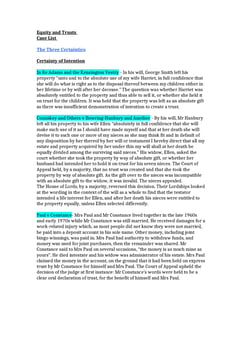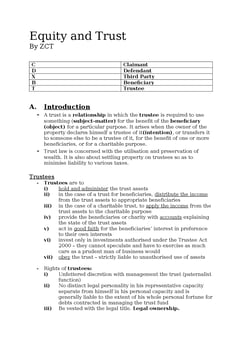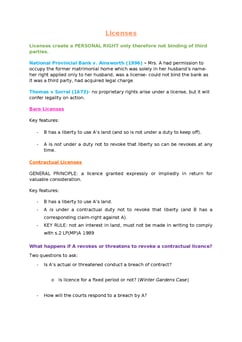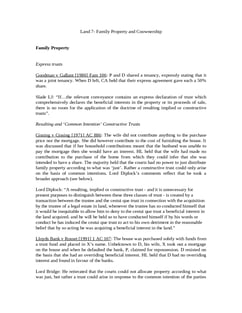Gissing v Gissing [1971] AC 886; 3 WLR 255
Judgement for the case Gissing v Gissing
KEY POINTS
A resulting, implied, or constructive trust arises when a trustee acquires a legal estate in land through a transaction with the beneficiary. This occurs when the trustee's behaviour would be unjust if they denied the beneficiary a beneficial interest.
Such behaviour includes inducing the beneficiary, through their words or actions, to act to their own detriment with the belief they were gaining a beneficial interest in the land.
FACTS
Mr. and Mrs. Gissing purchased a property for £2695, mainly financed by a mortgage in Mr. Gissing's name amounting to £2150. The property was conveyed solely in Mr. Gissing's name. Mrs. Gissing contributed £220 of her own money for furniture and lawn improvement.
Mr. Gissing consistently covered the mortgage payments. However, in 1961, he left to live with another woman and reportedly told Mrs. Gissing that the house belonged to her.
Subsequently, she obtained a divorce in 1966 on the grounds of his adultery, along with a maintenance order which was later reduced to just 1 shilling per year. She then initiated legal action asserting her right to an equitable interest in the matrimonial home.
JUDGEMENT
The House of Lords ruled in favour of the husband, stating that there was no contribution from Mrs. Gissing towards the house that could imply a beneficial interest.
COMMENTARY
The judgement underscores the principle that equitable interests can be created by indirect or non-financial contributions, and that the traditional approach of focusing solely on financial contributions may not fully address the contributions made within the context of a family.
The court's emphasis on detrimental reliance showcases the importance of the intention behind these contributions and the understanding between the parties involved.
ORIGINAL ANALYSIS
The wife did not contribute anything to the purchase price nor the mortgage. She did however contribute to the cost of furnishing the house. It was discussed that if her household contributions meant that the husband was unable to pay the mortgage then she would have an interest.
HL held that the wife had made no contribution to the purchase of the home from which they could infer a common intention that she was to have a share.
Lord Diplock
A resulting, implied or constructive trust - and it is unnecessary for present purposes to distinguish between these three classes of trust - is created by a transaction between the trustee and the cestui que trust in connection with the acquisition by the trustee of a legal estate in land, whenever the trustee has so conducted himself that it would be inequitable to allow him to deny to the cestui que trust a beneficial interest in the land acquired. and he will be held so to have conducted himself if by his words or conduct he has induced the cestui que trust to act to his own detriment in the reasonable belief that by so acting he was acquiring a beneficial interest in the land.
Thompson says it was wrong to run together conceptually different types of trust and omitted proprietary estoppel by which a wife could claim a share in the property.
NB both Lord Diplock and Lord Reid indicate that they would be prepared to accept indirect contributions to the purchase price, e.g. where the wife’s income goes on furnishing the house, so that the husband can afford to pay the mortgage, but for the precedent of Pettitt.
Lord Pearson
He takes the approach of imputing a common intention to the parties that a spouse acquires an interest in the property proportionate to her contribution to the original cost unless there is actually evidence to the contrary.
RELATED CASES
For Further Study on Gissing v Gissing

A collection of the best GDL notes the director of Oxbridge Notes (a...

Equity notes fully updated for recent exams at Oxford and Cambrid...
Need instant answers? Our AI exam tutor is here to help.
Ask questions 🙋 Get answers 📔 It's simple 👁️👄👁️
Our AI is educated by the highest scoring students across all subjects and schools. Join hundreds of your peers today.
Get StartedSimilar Cases
Related Product Samples
These product samples contain the same concepts we cover in this case.


